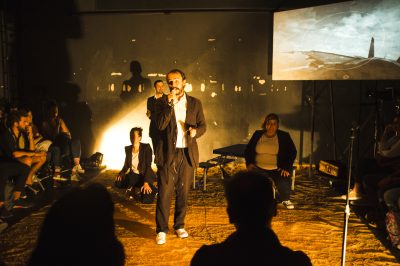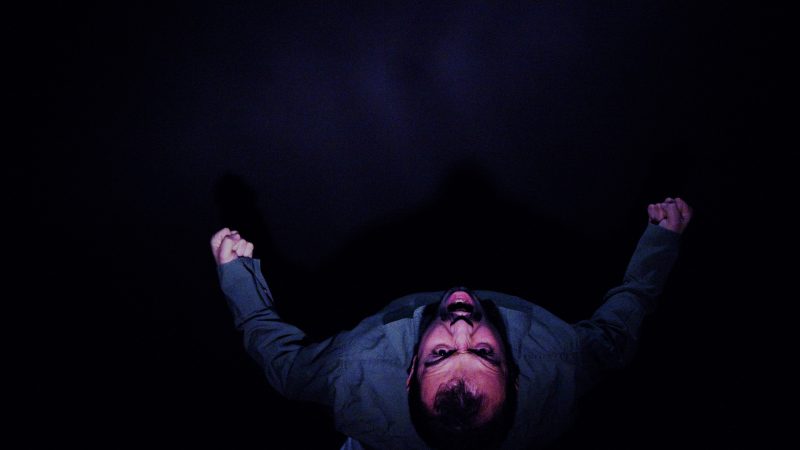Mazorra's art has brought him from Mexico to Spain

Juan Pablo Mazorra. Photo by David Ruano. Used with permission
An artist's work is a fusion of successes that take place during the creative process. The final product is then presented on stage in its immaculate form for the audience to appreciate. Actor, director and drama teacher Juan Pablo Mazorra knows this process all too well.
Mazorra's passion for different theatrical expressions brought him from his hometown in Puebla, Mexico to Spain, where he currently lives and works. During his career, he has worked in many prestigious institutions such as the Institut del Teatre and the Moveo centre in Barcelona. He is currently an actor in one of the oldest independent theatre companies in Europe, Els Joglars.
Mazorra is also a drama teacher and the founder and artistic director of the independent theatre company Parece una tontería (It seems silly). In 2018, he received the best actor award for the monologue “MIGRANTE” at the IX MUTIS Independent Theatre Festival, which is held every year in Barcelona.
Global Voices’ author Alejandro Barreto spoke with Mazorra about his art and how his experience abroad impacts his work.

“Set Segons. In God We Trust” by Falk Richter. Directed by Ruben Pérez. Photo by Markel Cormenzana. Used with permission.
Alejandro Barreto (AB): Why did you choose to work in the theatre and what commitment do you make to your profession?
Juan Pablo Mazorra (JPM): Porque honestamente, a los actores nos gusta sentirnos exhibidos, contar una la historia donde es el protagonista, sentir la interacción entre público y el mensaje que estás dando. Es un juego de dos, el actor y el público que ha pagado por entrar a verte, es un acto de comunión. Me gusta cuando actúo ver las caras del público, los gestos, la respiración, las risas, eso me apasiona.
Ahora bien, aunque suene idílico, creo que el teatro cambiará al mundo, o al menos un mundo, el de una persona. Lo imagino cuando la gente se acerca al final de la obra para felicitarte, darte sus puntos de vista y saber que quizás ese día llegará a su casa y durante la cena contará algo sobre lo que sintió o reflexionó gracias a una obra de teatro. La gente que va verlo, asiste con una expectativa, al menos pasar el rato, y ese es un buen momento para decirle que aparte de divertirse, vamos a reflexionar sobre un tema, o yo voy a plantear también las inquietudes que me preocupan, porque al final el teatro no plantea respuestas, sólo preguntas. El teatro modifica de muchas formas, yo me siento mejor persona gracias a él, es un trabajo de empatizar, me obliga a ponerme la piel de un personaje, entenderlo y no juzgarlo.
Juan Pablo Mazorra (JPM): Honestly, because actors like to feel exposed, to tell a story where they are the protagonist, to feel the interaction between the audience and the message that is being sent. It's a game between two players: the actor and the audience who has paid to see you perform. It's an act of communion. When I am acting, I like to see the faces of the audience, the gestures, the breathing, the laughter. It inspires me.
I know it sounds idealistic, but I believe that theatre will change the world, or at least one world, that of the individual person. I imagine it when people come up to you at the end of the play to congratulate you, to tell you their opinion. I know that, thanks to the theatre performance, maybe they will go home and say something about what they felt and thought over dinner. People who go to the theatre attend with a certain expectation, at the very least [they expect] to pass time. This is a good opportunity to tell them that on top of being entertained, we are going to reflect on a certain issue. Or that I am going to raise my own concerns, because in the end the theatre does not propose answers, only questions. The theatre changes in many different ways, and I feel that I'm a better person because of it. It is a job that requires empathy. It forces me to wear the skin of a character, understand it and not judge it.

“Migrante” directed by Neilor Moreno and Giselle Stanzione. Photo by Mayra Luna, used with permission.
AB: What is the current state of the theatre?
JPM: He tenido el privilegio de pisar algunos países y durante mi formación he podido intercambiar ideas con personas de muchas nacionalidades, y es triste reconocer que el común al hablar de la situación del teatro es siempre complicada e incierta. Pareciera que los artistas somos de los últimos eslabones en la cadena humana. El común denominador en México, en España y en casi todos lados, sigue siendo el mismo: pagos miserables, falta de interés por parte de los programas de gobierno para las artes, el poco hábito de la gente para ir al teatro, teatros que se ven obligados a cerrar, contratos inexistentes, pagos atrasados…. No se equivoca ninguno al decir que esta es una verdadera profesión de resistencia.
JPM: I have had the privilege to work in a few different countries and during my training I've been able to exchange ideas with people of different nationalities. It's sad to acknowledge that the common theme when talking about the theatre is its constant complicated and uncertain status. It seems that we, the artists, are one of the last links in the human chain. The common denominator in Mexico, Spain and almost everywhere else, remains the same: terrible pay, lack of interest from government programs for the arts, the fact that people don't go to the theatre often, theatres that are forced to close, non-existent contracts, late payments…. It wouldn't be wrong to say that this a true profession of resistance.

“ZENIT” From the Els Joglars company. Photo by David Ruano. Photograph used with permission.
AB: Why did you decide to go abroad to advance your career?
JPM: La razón principal por la que vine a España fue para estudiar. Quería profesionalizarme en un tipo de teatro muy específico y su estudio en México era complicado y/o inexistente. Fue un posgrado en teatro y educación, y un diplomado en mimo corporal dramático y teatro físico las que me hicieron viajar a Europa. Mientras vivía aquí, la compañía de teatro Els Joglars convocaron a casting y tras un largo proceso de filtros, me contrataron, así que tuve la oportunidad, al finalizar mis estudios de seguir viviendo en este país.
JPM: The main reason why I came to Spain was to study. I wanted to become a professional in a very specific type of theatre and study for this in Mexico was complicated, if non-existent. What made me travel to Europe was the opportunity to study for a postgraduate degree in theatre and education, and a course in corporeal mime and physical theatre. Whilst I was living here, the theatre company Els Joglars held auditions and after a long selection process, they hired me. This gave me the opportunity to continue living in this country after I had finished my studies.

“BRUELS'”. Written and directed by Oriol Morales. Photo by María Alzamora. Photograph used with permission.
AB: The concept of migration has become part of the discourse of your work. How does this reflect your experience?
JPM: Considero que muchos de los trabajos personales que desarrollo como artista siempre están permeados de una fuerte necesidad de hablar de una problemática social porque considero que todo artista es un ser político. Con la obra “Intermitentes” nos aventuramos a hablar del suicidio juvenil, con “ese lugar que nadie escucha” sobre la violencia contra la mujer, en “Tafus” sobre el duelo tras la muerte… y no es que la migración se haya vuelto mi discurso de la noche a la mañana. Creo que ser mexicano y no tener en la cabeza la palabra migración, se debe a que vives de manera muy privilegiada, o porque no has querido mirar la realidad que te rodea. La idea de que alguien tenga que dejar su lugar natal, por las razones que sea, ha sido siempre algo que he reflexionado mucho; pero hasta que me convertí en parte de esta estadística, fue que decidí convertir esa idea en un espectáculo. Así nace “Migrante” uno de mis proyectos personales al que más tiempo le he dedicado y qué más satisfacciones a nivel personal y artístico me ha dejado. Los artistas tenemos una gran capacidad de migrar, ojalá nadie tuviera que hacerlo por supervivencia, sino por placer y por la curiosidad de descubrir el mundo.
JPM: I think that a lot of my work as an artist is permeated with a strong need to talk about social issues because I believe that to be an artist is to be political. “Intermitentes” (Intermittent) broached the subject of youth suicide. In “Ese lugar que nadie escucha” (That place that no one hears) we talked about violence against women, in “Tafus” about mourning after death… and it's not as if migration has become part of my discourse overnight. I think that to be Mexican and to not have the word ‘migration’ in your head, is either because you live a very privileged life, or because you have not wanted to look at the reality around you. The idea that someone has to leave their birthplace, for whatever reason, has always been something that I've thought about a lot. But once I became part of that statistic, that was when I decided to turn the idea into a performance. This was how “Migrante” (Migrant) was born. This has become one of my personal projects to which I have devoted the most time and that has given me the most satisfaction on a personal and artistic level. As artists we have a great ability to migrate, although I wish that no one would have to do it for survival, but for pleasure and a curiosity to discover the world.
AB: Do you ever see yourself taking your training as an actor, playwright, and director back to Mexico?
JPM: Las pocas veces que he vuelto a México para visitar a mi familia, me las he arreglado para siempre impartir algunos talleres o compartir algo de mi trabajo; nada me haría más feliz que trabajar en México. Me encantaría que me inviten a dirigir una obra, llevar algún espectáculo mío de gira por allá o ir e impartir clases. Muero de ganas de regresar y aportar mi granito de arena, modificar y dar un punto de vista diferente en la situación teatral de mi país.
JPM: I have always managed to teach some workshops or share some of my work the few times that I have returned to Mexico to visit my family. Nothing would make me happier than working in Mexico. I would love to be invited to direct a play, take a show of mine on tour there, or go and teach. I am eager to return and add my two cents, to modify and to give a different point of view in my country's theatrical situation.
0 Comments